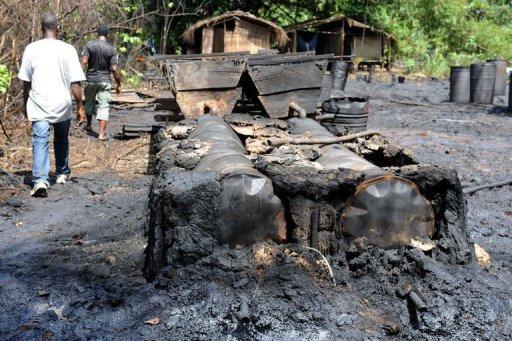
NIGERIA'S OIL CRASHING

The most oil-rich nation in Africa nearly ran out of gas this week.
Airlines grounded flights because they couldn't find jet fuel in recent days, and gas stations nearly all closed down. The companies licensed to restock Nigeria's fuel depots refused to do so, saying the government here—defeated in an election in March—owed them more than $1 billion.
The result was the worst fuel shortage here since a 1993 military coup, one that could echo for weeks in Africa's top economy. Television stations, banks, and cellphone towers all went offline. Doctors worried their emergency rooms would go dark, and several soldiers in the north said they considered halting their pursuit of Boko Haram and the women the Islamist terrorist group has kidnapped.
Late Monday, the shortage ended, when Nigeria's government agreed to look into the debts it owed. On Tuesday, gas stations reopened in this country of 177 million people.
But the spectacle of such crippling scarcity in a country that exports billions of dollars of oil each month is a window into the dysfunction of the oil sector.
Nigeria earns 75% of its budget from oil. The country uses much of that revenue to subsidize fuel prices. Nigerians buy gasoline for just $1.65 a gallon. To the companies that sell fuel to Nigeria, the government pledges to pay the difference between that price and the market rate within 45 days.
Over recent months, the government has fallen behind. The crashing price of oil has left Nigeria struggling to pay its bills. Government revenue fell 23% in the first three months of 2015, compared with the year-earlier quarter. Its debt jumped 52% during President Goodluck Jonathan's six years in office, to $64 billion. Servicing that burden now consumes more than a fifth of government revenue. Most state governments are in arrears, and some public servants say they have gone eight months without pay.
Against that grim backdrop, Muhammadu Buhari, a retired general who briefly ruled as a military dictator in the 1980s, defeated Mr. Jonathan in March, on a promise to clean up the way oil wealth is managed in a country that possesses the world's 10th-largest crude reserves.
Now, Mr. Buhari has his chance: "He has a mountain of work before him," said John Obayuwana, chief executive of Polo Ltd., a Lagos retailer of luxury watches and leather goods. His sales have slipped as Nigeria's fuel crisis and political uncertainty weigh on consumer spending.
"The resources are just not there to drive the economy," Mr. Obayuwana said.
A spokesman for Mr. Buhari declined to comment.
Fuel sellers have said they are owed $1 billion for the first three months of this year, and at least another $1 billion for April and May. They worried that Mr. Jonathan won't pay those bills before leaving office and that Mr. Buhari may do away with the subsidy. So they left ships full of fuel anchored off Lagos's Atlantic Coast port.
Mr. Jonathan's government said the amount importers demanded appeared inflated with fraudulent bills.
In recent days, the consequences piled up for average Nigerians, as the incoming and departing governments lobbied the same club of companies licensed to import fuel here. Internet and mobile reception disappeared: "Services are degrading and our customers are beginning to feel the impact," said Funmilayo Onajide, a spokeswoman for South Africa-based MTN Group, Nigeria's largest telecom.
Some television and radio stations went quiet on Monday. Passengers were stranded in sweltering airports over the weekend after airlines Arik Air Ltd. and AeroContractors Ltd. canceled most of their flights.
San Francisco-based Uber Technologies Inc., which launched its taxi-hailing mobile app in Lagos in July, has struggled to keep drivers on the road. "Demand is very high and supply limited," the app now warns prospective riders.
Vigilantes driving pickup trucks across the desert-like northeast of Nigeria ceased patrolling the rural areas where they had been hunting Boko Haram fighters. "We hardly patrol the nooks and crannies," said Mohammed Ibrahim, a vigilante there, blaming the fuel shortage.
In Lagos, the normally bustling city of some 21 million, streets went quiet. Drivers went to extreme lengths to find fuel. On a recent night there, 39-year-old chauffeur Yinka Adeinto was sitting on a bucket next to a gas pump. He had been hunting for a place to fill his empty tank all day, before giving up and plopping down on his makeshift stool for some sleep. His wife, pregnant with their first child, was at home in a house without power.
"This is not supposed to be," he said.
Late Monday, Nigeria's government persuaded fuel importers to open their depots and unload their ships. They agreed to create a committee that will investigate which debts are valid. The government threatened to revoke the import licenses of companies that didn't assent to those terms, said Ahmed Makarfi, chairman of Nigeria's Senate Committee on Finance.
"Arm twisting," said the senator. "That is one of the tools of negotiation."
Within hours, some gas stations had reopened. Cars that had lined up for blocks began to refuel.
Patrick Fola Ayanbadejo, a businessman who sells telecommunications equipment, waited in line until 4 a.m. before giving up to purchase gas at three times the subsidized rate from a young man carrying a jerry can on the outskirts of the station. "I didn't even get a full tank," he said.
"We should be in the clear," said Dolapo Oni, oil and gas analyst for Togo-based Ecobank Transnational Inc. "But we haven't addressed the fundamental issue. It could happen again."
wsj.com




